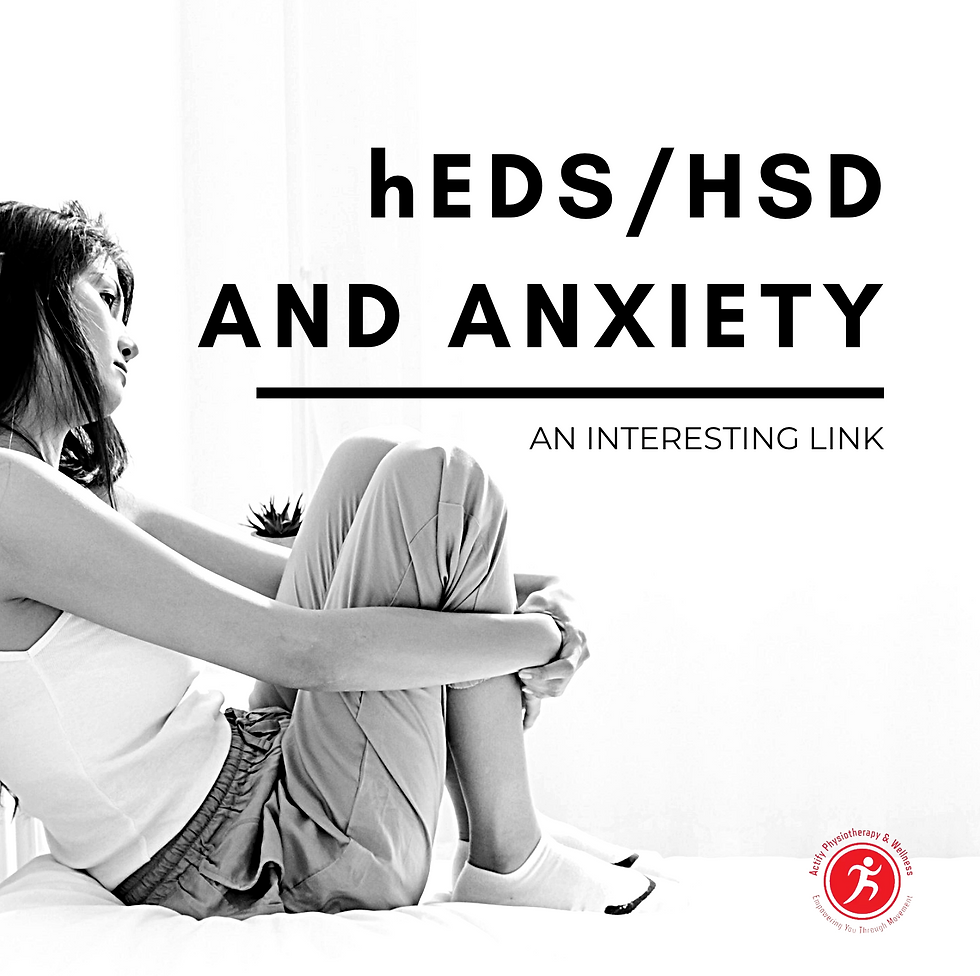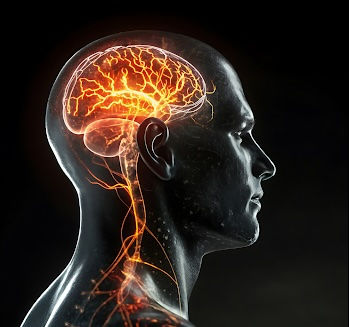Anxiety and hEDS/HSD
- Marcia Cristiane Perretto

- Feb 10, 2021
- 2 min read
Updated: Feb 5, 2024

There has been more and more evidence showing a high occurrence of anxiety in those with the hypermobile type of EDS (hEDS), and less, but still significant, evidence of a link with depression, eating disorders, and neuro-developmental disorders. There are a few underlying ideas that lead to this link such as genetic risks, problems with the autonomic nervous system, sensitivity to external stimuli, and decreased or impaired proprioception. In addition, recent studies have proved an increased response in emotion processing brain areas, which could explain high emotional reactivity (depression and anxiety).
Doctors have been exploring the connection between anxiety and hEDS/HSD for about 30 years, and its connection was actually made by accident. The coincidence found prompted researchers to look into the association between anxiety and hEDS/HSD, where they concluded two important studies. In one, they found that 70% of hEDS/HSD patients struggled with anxiety, in comparison to 22% in the “normal group”. But it's not just anxiety that has been studied, more recent research has looked into the co-occurrence of hEDS and other neuro-disorders such as ADHD. In this study they found that adults with ADHD had higher rates of joint hypermobility and problems with autonomic control of body functions (aka dysautonomia) compared to “healthy” patients.
But what causes this? This is where things get a little grey. There is a lot of back and forth between the nature and nurture aspect of anxiety and other mental disorders. It is of course plausible to assume that anxiety and other panic disorders can be exacerbated by a lack of receiving a proper diagnosis for years (a problem many hEDS/HSD patients have), but there are more biological causes to be considered when explaining this association. There are a couple proposed theories for the correlation between anxiety disorders and hEDS/HSD:
Structural differences in emotional-regulating parts of the brain: there is a lot more research that needs to be done into this theory, but researchers believe it has to do with the collagen formation in those with hEDS/HSD.
Poor control of automatic bodily functions: many EDS patients have a hard time coming out of fight or flight mode (often due to dysautonomia i.e., POTS, IST), when we are in heightened modes of anxiety, our bodies are normally in fight or flight, and it is hard for patients with dysautonomia to regulate this.
Whichever psychiatric manifestation you feel you may be dealing with, it needs to be explored and properly evaluated by a licensed psychiatrist. Pain, negative feelings, and poor emotional regulation due to rapidly changing symptoms is normal for those with hEDS/HSD, and considering all these aspects is important to bring up with your psychiatrist in order for them to get a full picture of your life with EDS. And there are many different treatment options for anxiety and other mental disorders, including, CBT (cognitive behavioral therapy), EFT (emotionally focused therapy), meditation, medications, and most importantly, self compassion!
Be sure to consult with your primary care physician or other medical professionals in regards to your medical concerns. This text cannot and should not replace advice from the patient's healthcare professionals. Any person who experiences unusual symptoms or feels that something may be wrong should seek individual professional help for evaluation and/or treatment.
.png)



Living with hEDS (hypermobile Ehlers-Danlos syndrome) or HSD (Hypermobility Spectrum Disorder) is already challenging enough—but adding anxiety into the mix can feel overwhelming. For the longest time, I felt like no one really understood how deeply the physical and emotional sides of my condition were connected. Then I found The Psych NP online psychiatrist , and it was the first time I truly felt seen. What I love about their approach is how personalized it is. They don’t just hand out a diagnosis and a prescription—they take the time to dig deep, to understand the full picture. With hEDS/HSD, anxiety can be linked to chronic pain, medical trauma, or just the constant unpredictability of how your body will feel. The team at The Psych…